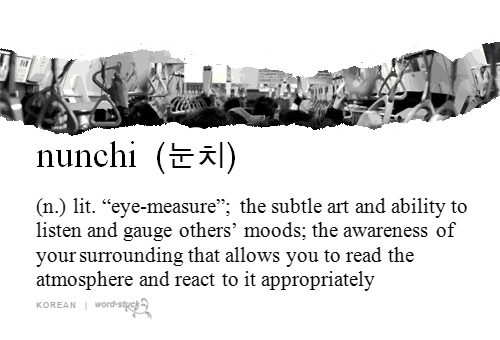Hello peeps! @ailindigo here :)
For this 19th week of Untranslatable Words we're moving to Asia one more time, visiting Korea! This week's word is one that many believe is behind the Korean people success.
This week's word is the korean: nunchi.

Gif by Wordstuck
nunchi
I've always thought this is such great ability for one to have, especially if facing social situations constantly, something I would say it's very linked to the common called emotional inteligence.
nunchi literally means "eye-measure" and refers to the subtle art and ability to listen and gauge others' moods.
It's about a good reading of the signs of any social situation in order to have an overall vision of the context or atmosphere and to recognize what the rest of the people involved are thinking or feeling, thus we know how to interact or react. A very helpful kind of sensitivity. What in western culture it's described as Emotional Intelligence. *
This concept highlights the importance of sensitivity and empathy. According to Euny Hong, the author of The Power of Nunchi, "The West emphasizes autonomy and individualism, while the 'nunchi' seems to assert the opposite." As it might be hard for us to associate corporate figures to sensitive and empathetic people, nunchi can be confused with manipulation; though nunchi doesn't have anything to do with managing a situation so that it plays in our favor to the detriment of others, but to do so in order to create a better atmosphere for everyone. nunchi is a way of understanding social relations that moves away from individualism and emphasizes unity, relationship building and collective harmony. *
nunchi is about being connected with your sorroundings. According to Hong, who is a korean-american writer, this ability is not only helpful for us as individuals but it's also key factor in the rapid development of Korea, a country that, in a few generations, went from being one of the poorest regions in the world to becoming a culturally and economically powerful country. In there, kids know this word at age 3 and learn that not having nunchi is a negative thing, Hong says “You usually learn it in the negative; if everyone is standing on the right side of an escalator and a kid is lounging on the left, the parent will say, ‘Why don’t you have any nunchi?’ It's partly about not being rude, but it's also partly, ‘Why are you not plugged into your environment?’” *

Art by Hannah K. Lee on How Well Do You Read Other People?
However, what's most important is to have a quick nunchi (눈치 빠르다 – nunchi ppareuda), Koreans don't say someone has a good "nunchi" but that they have it quick. According to Hong, not only are people more comfortable and happier with people who have a quick nunchi, but listening carefully and gathering information about others before speaking also allows us to have better performance. *
Thus, developing our nunchi can help us to be successful in social, emotional, work or business relationships, as we are more likely to fit in by adapting to the context and to make connections, instead of making a wrong move that makes us look incompetent and provoking rejection by those around us if we lack this ability. As this is a skill based on discretion, what is key for its development is observing and analyzing how individuals act and react within a space before we speak and act ourselves, and from these observations make potentially useful assessments about the nature of relationships and hierarchies within a group, the general mood and how to behave accordingly. *
There's even a phrase for someone who lacks nunchi (눈치 없다 – nunchi eoptta), it refers to someone that is clueless, someone that doesn't know what's going on, or simply doesn't have any common sense.* So, as nunchi is seen as having common sense, which in my opinion is a good and very proper association, I think this tells a lot on the Korean way of building any kind of relationships as it shows how important sensitivity, empathy and wellness-for-everybody are for them and their culture (having a word – exclusivity that encompasses such concept). It is indeed something the rest of the world should also cultivate.
What do you think? Is your nunchi quick you're always clueless? Do you think nunchi is really an useful and developable skill? Please feel free to let me know what you think in the comments!
Thank you very much for passing by! And if you have an Untranslatable Word you'd like to suggest, please don't hesitate to do so! :)
Previous Untranslatable Words:
#1: Torschlusspanik
#2: Mono no aware
#3: Rasāsvāda
#4: Cavoli riscaldati
#5: Nefelibata
#6: Sturmfrei
#7: Jootha
#8: bilita mpash
#9: resfeber
#10: Vāde mēcum
#11: sankofa
#12: annus mirabilis
#13: voorpret
#14: pikit mata
#15: ranorànilac
#16: gagung
#17: gumusservi
#18: yaourter
This content is part of a new series to get more people interested on languages and how they, perception and culture are related!
Exclusively for the Hive Cross Culture Community, the community for language exchange and cross-cultural purposes.
If you'd like to be part of the discussion don't hesitate to hop into the Hive Language and Culture Exchange Discord server! As well as subscribing to the Hive Cross Culture Community so you don't miss any new word comming ;) We'll be sharing a new Untranslatable Word each week!

